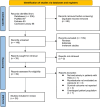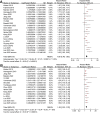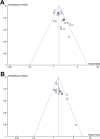Myosteatosis and the survival of patients with hepatocellular carcinoma: a meta-analysis
- PMID: 40377729
- PMCID: PMC12084174
- DOI: 10.1007/s10238-025-01671-6
Myosteatosis and the survival of patients with hepatocellular carcinoma: a meta-analysis
Abstract
Myosteatosis, characterized by fat infiltration into skeletal muscle, is increasingly recognized as a prognostic factor in hepatocellular carcinoma (HCC), although the results were not consistent. This meta-analysis aimed to summarize impact on overall survival (OS) and progression-free survival (PFS) in patients with HCC.A systematic search of PubMed, Embase, and Web of Science was conducted to identify observational studies reporting survival outcomes in HCC patients with and without myosteatosis. Pooled hazard ratios (HRs) with 95% confidence intervals (CIs) were calculated using a random-effects model. A total of 24 retrospective cohort studies involving 7436 HCC patients were included. Myosteatosis was significantly associated with poorer OS (HR: 1.60, 95% CI: 1.40-1.83, p < 0.001, I2 = 65%) and PFS (HR: 1.53, 95% CI: 1.33-1.76, p < 0.001, I2 = 36%). Subgroup analysis revealed a stronger association in Asian studies (HR: 1.74 for OS; 1.57 for PFS) compared to European studies (HR: 1.08 for OS; 1.05 for PFS). The prognostic impact remained significant regardless of anticancer treatment type, myosteatosis assessment method, sex-specific or universal cutoff values, and follow-up duration (p for subgroup differences all > 0.05). The results remained significant in studies adjusting for sarcopenia (HR: 1.89 for OS; 1.50 for PFS). Meta-regression analyses did not suggest any of the following variables may affect the results, including sample size, mean ages of the patients, proportions of men, follow-up durations, and study quality scores (p all > 0.05).Myosteatosis is independently associated with worse survival in HCC patients, particularly in Asian populations. These findings highlight the significance of assessing muscle quality as a prognostic factor in HCC.
Keywords: Hepatocellular carcinoma; Meta-analysis; Myosteatosis; Progression; Survival.
© 2025. The Author(s).
Conflict of interest statement
Declarations. Conflict of interest: The authors declare no competing interests. Ethics approval: Institutional Review Board approval was not required because this is a meta-analysis. Consent to participate: Not applicable. Consent to publish: Not applicable.
Figures



References
Publication types
MeSH terms
LinkOut - more resources
Full Text Sources
Medical

